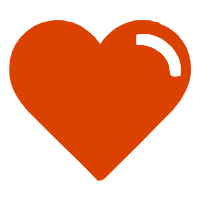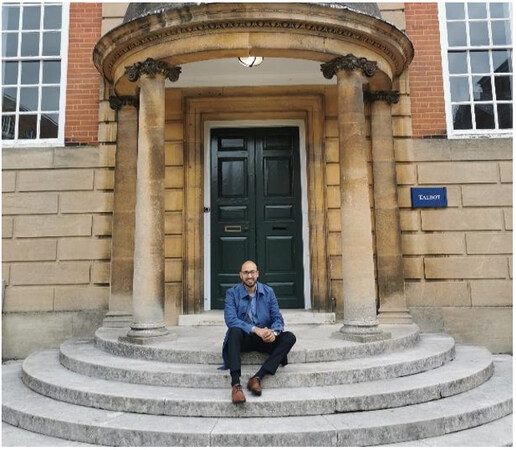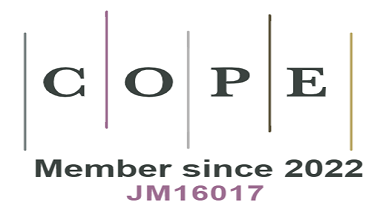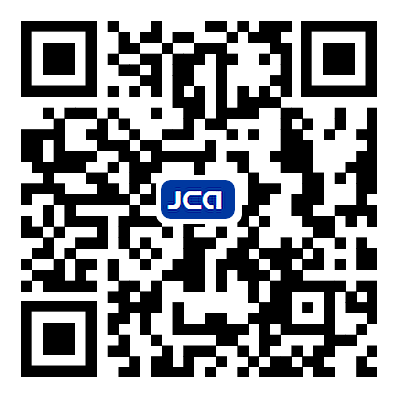Every day is an opportunity to learn something new
Knowledge is the outcome of learning. No matter what the subject is, learning drags one out of daily drudgery and changes one’s perspective on life. Human learning starts at birth, if not before. It is a consequence of human-environment interactions and continues until death. However, active learning is a process in which one takes control of learning experiences and monitors the mastery of the subject. Knowledge from active learning empowers one to influence other minds and, therefore, change the world. As Francis Bacon, the English philosopher and writer, says, “Knowledge is Power”. It is important that each of us eagerly engage in active learning every day.
This profile is written over a short talk with Dr. Mahmoud Abdellatif [Figure 1], a brilliant young scientist who considers every day as an opportunity to learn and improve. He is originally from Egypt and has just started his research group at the Department of Cardiology and University Heart Center, Medical University of Graz, Austria. His work focuses on deciphering the molecular mechanisms driving aging in the cardiovascular system and how these can be exploited to treat age-related maladies for which there are limited therapeutic interventions, like heart failure with preserved ejection fraction (HFpEF).
How long have you been in Europe and when did you start your journey to become a cardiovascular scientist?
I came to Europe more than a decade ago. After qualifying in clinical medicine in Egypt, I participated in an exchange program that allowed me to study abroad. I chose Porto in Portugal, where the university offered a unique Master’s course focused on cardiovascular pathophysiology. People typically choose to pursue a Ph.D. program right after graduating from medical school. I was not sure whether I was ready to pursue a Ph.D. degree and did not know whether I wanted to spend 4 years away from the clinic. I just wanted to have a taste of doing basic science research. Nonetheless, by the end of my master’s degree, I was determined to pursue a Ph.D. degree. In my mind, it had to be in the same realm as my Master’s dissertation that dealt with HFpEF. Thus, I moved to Austria, where I started and continued to work on cardiovascular aging and its relation to HFpEF for more than seven years. In the meantime, I also completed postdoctoral training in Paris. I traveled between Austria and France for two years. I just very recently settled down in Austria to establish my group, thanks to local and national funding that I received.
Are you planning to pursue clinical work besides the research?
I always thought that I would just do research for a while and then work in the cardiology clinic at a hospital like most medical residents. I had the opportunity to work in the clinic alongside my research, but I decided to focus only on research because it is easy to lose balance when doing both. I hope that when I look back in a few years, I would feel like I contributed meaningfully to the field- no matter how small it may be. It would be very rewarding and satisfying. Treating patients is of course satisfying too, and I do miss it as a physician. But as I said, I hope to contribute something that, who knows, will lead to a treatment or help develop something that helps thousands of patients. Currently, I cannot even imagine myself not doing research, and I do very much see myself as a scientist.
Has anybody inspired you to pursue science?
There have been people with big stories, like Werner Forssmann, who started heart catheterization by conducting the procedure on himself. The amount of dedication that some scientists have shown is insane and yet so inspiring. I have also been surrounded by wonderful mentors who combined humor, fun, and excellent commitment to work that I look up to all the time. My Ph.D. supervisor Simon Sedej and postdoctoral mentor Guido Kroemer, as well as my young supervisor back in Porto, André Lourenço, have all had a significant mark on my career. I learned a lot from them, not only scientifically, but also as a human being. I do feel a lot of gratitude to them because I developed a lot over these years, thanks to their continued support throughout my career. I think, in this profession, we are privileged to be surrounded by a lot of great people that we can always look up to and learn from.
What daily habits have you had that helped you pursue your career?
I read somewhere early during my Ph.D. training that it is important that you feel like you learned something every day. This is what I have been trying to do as hard as I can. It is not always possible to go home every day and feel that you have learned or done something significant. But if you have that mindset, then you will somehow subconsciously avoid wasting time and look for opportunities to learn more. I strive to learn something daily, even if minor, which can be reading a new paper that just came out or a very old one that I never came across, or even learning a new trick in Excel that can save me a lot of time in the future. So, do not ever stop learning- because that is when you stop progressing.
What would be a piece of advice from you to the younger generation of scientists?
I think, as Ph.D. students, we all fall into this trap when just starting- being too excited! You just want to do everything, and then it becomes difficult to consistently keep up such a tempo day in and day out. Just doing more does not always mean you are doing better or you are doing well. It is important to go back sometimes and reevaluate your work and read a little bit about what you are doing. Also, some of the new things that you want to learn can be far out of your comfort zone. We live in a time where it is easier than ever to learn about anything and you can teach yourself virtually anything you want. You need to invest time and effort wisely into learning things that will have a long-lasting impact on your work and career. For instance, you should not waste months trying to establish a one-off experiment when you could ask a collaborator to help.
How do you balance your personal life with work? Do you have any tips for others?
To have balance, you must be aware that you need balance. Fortunately, the topic of work-life balance has recently caught more attention in the scientific community. In my personal life, together with my wife who also did a Ph.D., we have developed to be aware of this and constantly try to remind each other not to lose track.
What do you see as a major challenge for young scientists?
If you had asked me a couple of weeks ago, I would have said to be able to start their research groups. I am glad that I have received sufficient funding recently to be able to achieve this, which should also hopefully help me secure a more permanent position. Irrespective, I think having a permanent faculty position is the toughest challenge for every young researcher worldwide. We need more opportunities and support. It is getting tougher, especially with the current economic situation. Although we are at a time where we need to invest even more in research, as we noticed with the COVID-19 pandemic, unfortunately, a lot of people are quitting research. This sort of brain drain is a big loss for academia because universities invest a lot of time and resources in the training of scientists and then, quite often, many have no choice but to leave. This does not mean that no one should go to industry, but if this scientific exodus continues, there will be no scientists to work in academia or industry.
What media resources do you use and recommend young investigators to use?
I’m not trying to advertise Twitter, but I use it often. It has even changed my approach to following up on science. If you follow the right people and journals that you are interested in, then you do not have to see every issue of the journals (the classical way we used to). In fact, since the number of journals has increased exponentially, it is only becoming more and more difficult to keep up with the literature. Twitter gives you a choice to decide what areas you are interested in, and then related research is almost “served” to you.
DECLARATIONS
Authors’ contributionsThe author contributed solely to the article.
Availability of data and materialsNot applicable.
Financial support and sponsorshipNone.
Conflicts of interestThe author declared that there are no conflicts of interest.
Ethical approval and consent to participateNot applicable.
Consent for publicationNot applicable.
Copyright© The Author(s) 2023.
Cite This Article
Export citation file: BibTeX | RIS
OAE Style
Rouhi L. Every day is an opportunity to learn something new. J Cardiovasc Aging 2023;3:13. http://dx.doi.org/10.20517/jca.2023.05
AMA Style
Rouhi L. Every day is an opportunity to learn something new. The Journal of Cardiovascular Aging. 2023; 3(2): 13. http://dx.doi.org/10.20517/jca.2023.05
Chicago/Turabian Style
Rouhi, Leila. 2023. "Every day is an opportunity to learn something new" The Journal of Cardiovascular Aging. 3, no.2: 13. http://dx.doi.org/10.20517/jca.2023.05
ACS Style
Rouhi, L. Every day is an opportunity to learn something new. J. Cardiovasc. Aging. 2023, 3, 13. http://dx.doi.org/10.20517/jca.2023.05
About This Article
Copyright
Data & Comments
Data

 Cite This Article 6 clicks
Cite This Article 6 clicks













Comments
Comments must be written in English. Spam, offensive content, impersonation, and private information will not be permitted. If any comment is reported and identified as inappropriate content by OAE staff, the comment will be removed without notice. If you have any queries or need any help, please contact us at support@oaepublish.com.